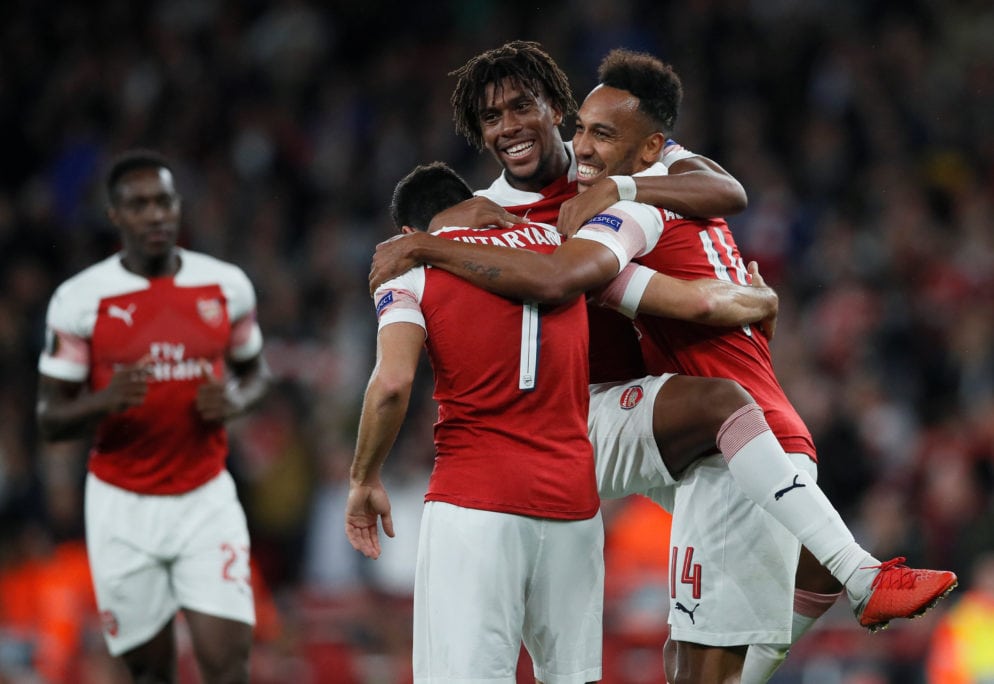Arsene Wenger’s 22 year reign at Arsenal came to an end in May when the Frenchman stepped down, with Unai Emery chosen to lead the club into a new era. As we enter the international break, we look at what has changed in north London.
What’s the same?
Rotation in cup competitions
The first half of last season saw Wenger make wholesale changes to his line-up for the cup competitions as he could call upon the likes of Olivier Giroud, Theo Walcott and Jack Wilshere from his reserves. The former pair, along with Matthieu Debuchy and Francis Coquelin, left in January, with Wilshere following in July.
However, these departures have not discouraged Emery from a similar approach. Danny Welbeck and Alex Iwobi have started in all three of the Gunners’ cup games so far in 2018/19, while Mohamed Elneny and Stephan Lichtsteiner have been given their only starts in the League Cup and Europa League. Eighteen-year-old Emile Smith Rowe has also made two starts.
Goal scoring burden shared
Including an unfortunate own goal from Issa Diop, Arsenal’s first ten league goals this season were all scored by different players. Aaron Ramsey has since added his name to that list while Smith Rowe, Sokratis Papastathopoulos and Matteo Guendouzi all netted their first goals for the club in the recent win at Qarabag.
It was a similar story a year ago, when 11 different Arsenal players found the net in the first 11 fixtures. By the end of the season Wenger boasted 22 different goalscorers, although the shake up in the January transfer window contributed to this. Alexandre Lacazette was the club’s leading scorer but only netted 17 of his side’s 113 goals (15%).
Poor defence
Arsenal have nine straight wins for the first time since October 2007, but that doesn’t provide the full picture. Emery’s side could not keep a clean sheet in their first six fixtures, and have faced 36 shots in the three matches in which they have kept the opposition out. West Ham, Everton and Watford could have each left the Emirates with a win, but poor finishing cost them three points.
In fact, the Gunners have actually conceded one goal more than they had done by this stage last year, despite trips to Liverpool and Chelsea in 2017.
What’s new?
Pressing
Emery arrived in London with a reputation for forging teams that pressed aggressively and his influence was immediately clear in Arsenal’s opening defeat to Manchester City, when the front line won back possession on numerous occasions but could not convert the opportunities into goals.
Such an approach, however, has certainly left his team vulnerable. Chelsea and West Ham both exploited huge spaces between midfield and defence to counter and score in August, with the latter side wasting numerous chances when Arsenal had been too slow to recover possession. This should improve as the Gunners get to grips with the system, but until then the defence is exposed.
Granit Xhaka
Originally touted as a holding midfielder, Granit Xhaka has not looked comfortable in the “number six” role since he arrived in the Premier League two years ago. Despite his strength and passing ability, the Swiss’ defensive discipline has been called into question on numerous occasions, and two needless red cards in his first six months suggested a liability.
Emery has so far deployed Xhaka in a role more akin to his position for Switzerland, for whom he wears the number 10 shirt. Guendouzi and fellow newcomer Lucas Torreira have taken the defensive responsibility from Xhaka’s shoulders, with the latter in particularly allowing him license to push forward.
Second half resolve
Arsenal have gone into half time level in all of their past seven league matches, but a strong second half showing has seen them win each of the past six. This is already an improvement on last season, when Wenger’s side only won five of the 15 games where the scores were even at half time.
In fact, 21 of the Gunners’ 31 goals so far this season have come in the second half (67.7%), a drastic increase on last season’s final tally of 65 from 113 (57.5%). It appears that Emery’s tactical changes at the interval, and ensuing substitutions, are turning matches in his side’s favour.
